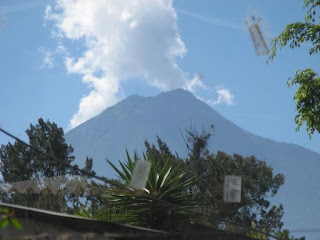Today I had my first 5 hours of Spanish with my new teacher, Rebeca Gonzales, 34, at Probigua.
 She lives with her mother and several siblings and is in her 4th year studying law. She is smart and fun to talk to. No English is spoken in the school, which is good.
She lives with her mother and several siblings and is in her 4th year studying law. She is smart and fun to talk to. No English is spoken in the school, which is good.When she becomes a lawyer (hopefully next year), she is not sure how easy it will be for her to get a job - she feels there is a lot of machismo around. Her mother is illiterate, and her father barely literate. Rebeca´s mom has pushed her 5 daughters to study. Rebeca says machismo is alive and well in her country, and has a low opinion of the current crop of politicos.
She is a good, patient teacher, and we have enjoyed many laughs together. This is our small table where we study. Another student can be seen in the back. The school has probably 10 PCs with high speed internet. I am using one to type this. The Internet connection at Probigua was faster than anywhere else that I tried in Antigua or Copan. The keyboards are Spanish and it takes a while to get used to. The @ symbol, for example, requires ALT and CTL plus the @ key, or one can press the ALT key then 6 and 4. I have yet to find the backslash.
The weather is very pleasant and sunny - in the 70s during the day but cold at night. Several large volcanoes loom over the area. Fuego and Agua and Acatenango. Only the lowest, Fuego (12,300 ft) is active but apparently the locals have made peace with it. My house mate Juan says he climbed it the other day and the lava smoked the rubber on his shoes. Rachel did not think he was being very smart.

.
Volcan Agua from near my desk in Probigua School- about 2x zoom.
.
 Teaching at Probigua takes place in a large room with several levels and lots of plants. The walls extend only 75% up so one can see the trees and hear the birds. At break Rebeca and I sampled a local fruit out back. It was OK - a type of guava called a "guayaba". She pointed out a small avocado tree which the manager planted. One can help oneself but I think the avocados aren't ripe yet. One can see Volcan Agua from near my desk, so I guess I may get some advance warning if it erupts.
Teaching at Probigua takes place in a large room with several levels and lots of plants. The walls extend only 75% up so one can see the trees and hear the birds. At break Rebeca and I sampled a local fruit out back. It was OK - a type of guava called a "guayaba". She pointed out a small avocado tree which the manager planted. One can help oneself but I think the avocados aren't ripe yet. One can see Volcan Agua from near my desk, so I guess I may get some advance warning if it erupts.What is great is that Rebeca has me tell her things in Spanish and gently corrects me as I go. I make notes. It is very important to get lots of practice speaking, even if one gets stuck. She also describes life in Guatemala and I stop her when I don't understand. I have a bunch of homework if my brain can take it. At the end of 5 hours my brain is well exercised! I think 4 hours per day is a better bet - I will reduce my hours to this next week.
One-on-one teaching is a novel experience for me. The huge advantage is that the teacher can adjust the level and pace to suit the student. However, one cannot goof off as one can in a class with many students. Yesterday, for tarea (homework) she suggested that learn the Spanish names for 27 parts of the body. (Truly, I counted them). I figured I could just spout them off. But no, I had to create a sentence with each one. She helped me if I got stuck - like when I had think of a sentence including el codo (elbow). So I tried that it pains me when I knock it on the table. She helped me with the word for knock, but in return, I have an extra word to learn for homework. Of course one doesn't have to do the homework. It all depends on one's motivation...
Some students start school knowing only Hola and Banio. That's OK. The teachers start from there and patiently help you along. There is little doubt in my mind that total immersion is the way to go. No one keeps score. Each student advances at his or her own pace. The schools and families know to speak slowly and be patient. The locals love it when gringos practice their Spanish. It is a big complement to them that we gringos take the trouble to study their language. It is also a nice way to learn more about their culture and history.
.
Probigua is a school with a good mission. Its name is a contraction of Proyecto Biblioteca de Guatemala (Library Project of Guatemala). The school is a non profit and employs only women. Rebeca told they find the women to be more responsible. Which sounds familiar. Not only does it promote women (and does this fairly, per Rebeca), but it also devotes part of its income to setting up libraries in remote villages which have little access to books.
The school has a mobile library built upon an old bus. It also acts as a conduit for several US and European nonprofits, which donate scholarship money for poor Indigena students. One non profit is Child Aid (Portland OR). The students have to sit exams to qualify. Last Saturday about 40 came to the school for the scholarship awards.
Over 50% of Guatemalans are Indigenas, who are descended from the Mayans and are mostly poor. According to Unicef's State of the World's Children 2008, Guatemala has an adult literacy rate of only 69%, and that of females is only 84% of males. In Nicaragua, thanks largely to the Sandinistas who took over in 1979 and who have promoted literacy and women's rights, the adult literacy rate is 77%, and young women are the same as or better educated than men. These results belie the fact that Guatemala is more than twice are wealthy as Nicaragua - $2640 vs. $1000 GNI per capita.
There are about 10 students here at present which is about 20% of capacity - November and December are slow. Not good for the teachers, as they work only when there are students. Nice for the students, because the facilities aren't crowded and one can relate more to the staff. Rebeca told me that she gets about $2.50 per hour (after deductions) for teaching (of the $5.20 per hour which we pay the school), but that work is slack from Sept to March. So she earns less than $2000 p.a., or about $150 per month on average. She estimates that perhaps 50% of the people are fully employed, 20% partially or sub employed (e.g. graduates doing unskilled work) and 30% unemployed.
.
Several months ago, a student from Europe gave her laptop to Rebeca. However, it had become infected with viruses, and she could not connect to the Internet. She asked me if I could help her with it. She also wanted to install Skype and then to use the schools video camera and microphone to work with their online Spanish program, called Speak Shop. This program, which was set up by a couple in Oregon, allows students all over the world to connect to a teacher at Probigua, and to have an hour long Spanish lesson online. Teacher and student can see and talk to each other. Cost is $10 per hour- very reasonable. I spent much of yesterday setting up Rebeca´s PC. It was a Spanish lesson (in computer jargon) at the same time - a win-win situation! I was able to install AVG free and to rid her PC of 4 viruses, to update her WXP, and to get her PC talking via Skype and Speak Shop. She was delighted. It is a nice laptop. Such items are beyond the reach of even middle class Guatemaltecos.
 .
.Out back at Probigua school. We tried studying there one day but the dogs next door have puppies and the parents are rather sensitive. The barking drove us back indoors.
.
 .
.Quite a few birds can be seen here during the day, including hummingbirds.
.
 .
.The views out back are nice - forested hills, flowering trees.
.
This morning it was about 65-70 F and sunny if a little breezy. Wonderful. I had on a short sleeve shirt. But Rebeca my teacher was shivering, even though she had on a shirt, sweater and a down vest. So I loaned her my polypro top (which hadn't been washed in a while) but she didn't care and she put it on over everything and felt much better. I figured that I needed to keep her in a good mood or my tarea would be awful.
 .
.Yesterday, part of the students´ tarea (homework) was to buy two types of fruit each, and to bring these to a communal get together at the school (at 11 am today). One purpose was to get us used to asking for help from the locals. I drew lichas and jocotes. First I tried my electronic dictionary- it had no idea. So I wandered off to the market, and had a good time asking various ladies where to find the fruit. I had seen neither before.


.
Our gang of students and teachers, learning about the local fruit.
.
 .
.School Staff member Maria with her young son, who came in one afternoon to help his mother clean up.


No comments:
Post a Comment